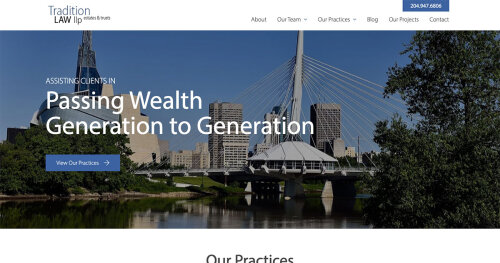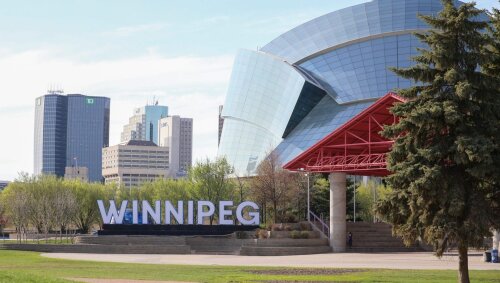Best Energy, Environment & ESG Lawyers in Winnipeg
Share your needs with us, get contacted by law firms.
Free. Takes 2 min.
List of the best lawyers in Winnipeg, Canada
About Energy, Environment & ESG Law in Winnipeg, Canada
Energy, Environment, and ESG (Environmental, Social, and Governance) law in Winnipeg, Canada, is a specialized field focused on regulations and legal practices related to natural resources, environmental protection, sustainability, and corporate governance. Winnipeg, as the capital of Manitoba, operates under provincial, federal, and municipal laws that balance economic growth with the responsible stewardship of resources and protection of the environment. ESG issues have become increasingly important for businesses and organizations as they face standards regarding their environmental impact, social responsibility, and governance practices.
Why You May Need a Lawyer
There are many situations where individuals, businesses, or organizations in Winnipeg may require the expertise of an Energy, Environment, or ESG lawyer. These include:
- Project Development: Legal guidance is needed to navigate permits and approvals for new energy developments, infrastructure projects, or resource extraction.
- Business Compliance: Businesses must comply with environmental regulations, emission standards, and reporting requirements set by various authorities.
- Land Use and Zoning: Legal advice is essential when dealing with land use rules, zoning changes, and environmental impact assessments for development projects.
- Disputes and Litigation: Lawyers help resolve disputes over contamination, land rights, regulatory compliance, and cleanups.
- ESG Reporting and Standards: Companies are increasingly required to provide transparent ESG disclosures to stakeholders, which involves complex regulatory and legal considerations.
- Renewable Energy Initiatives: Entities involved in wind, solar, hydro, or bioenergy projects require legal support to secure contracts, incentives, and approvals.
- First Nations and Indigenous Issues: Lawyers support negotiations involving Indigenous rights, duty to consult, and development on treaty or traditional lands.
Local Laws Overview
In Winnipeg, energy, environment, and ESG legal matters are governed by a mix of local, provincial, and federal laws. Key laws and regulations include:
- Manitoba Environment Act: Provincial legislation regulating activities that impact the environment, requiring permits for certain projects, and mandating environmental assessments.
- Clean Environment Commission (CEC): A Manitoba body that holds hearings and makes recommendations on major projects affecting the environment.
- Water Rights Act: Manages the allocation and use of water resources, including permits and environmental impact considerations.
- Canadian Environmental Protection Act (CEPA): Federal law addressing pollution prevention and the control of toxic substances for activities in Winnipeg and across Canada.
- Greenhouse Gas Emissions Regulation: Manitoba and federal governments regulate emissions and encourage the reduction of carbon footprints.
- Municipal By-Laws: City of Winnipeg by-laws govern zoning, waste management, stormwater, and local environmental protections.
- ESG Disclosure Requirements: Companies may be subject to voluntary or required ESG reporting, especially when listed on stock exchanges or operating in regulated industries.
- Consultation with Indigenous Peoples: Legal requirements for project proponents to consult with affected First Nations where applicable.
Frequently Asked Questions
What is ESG, and why does it matter for Winnipeg businesses?
ESG stands for Environmental, Social, and Governance. It refers to the standards and practices companies follow related to environmental impact, social responsibility, and how they govern their operations. ESG matters because stakeholders, investors, and regulators increasingly expect companies to operate sustainably and transparently. It also impacts access to capital, public perception, and legal compliance.
What permits are needed to start an energy project in Winnipeg?
Requirements depend on the type and scale of the project. Most projects need approvals under the Manitoba Environment Act, relevant municipal by-laws, and possibly federal regulations. Environmental assessments, consultation with affected communities, and other specific permits may also be required.
How are environmental violations enforced in Winnipeg?
Enforcement is handled through a combination of municipal, provincial, and federal agencies. Penalties for violations can include fines, orders to remediate environmental harm, and, in severe cases, criminal charges or revocation of permits.
Do property owners need to worry about historical contamination?
Yes. Property owners and buyers can be held responsible for contamination, even from previous uses. Environmental site assessments are advised before purchasing land, and remediation may be required under provincial law.
What rights do Indigenous communities have regarding resource projects?
Indigenous communities have constitutionally protected rights, including the right to be consulted and, where appropriate, accommodated regarding resource development on traditional or treaty lands. Failing to follow these processes can result in legal challenges and project delays.
Are renewable energy projects eligible for government incentives?
Yes. There are various federal and provincial programs to support renewable energy in Winnipeg, including funding, tax incentives, and grants. Requirements and availability change frequently, so legal advice can help identify current opportunities.
How can companies ensure compliance with ESG regulations?
Companies should develop clear policies, conduct regular audits, stay updated on regulatory changes, and engage legal counsel to review disclosures and compliance programs. Transparent and accurate reporting is key.
What steps should businesses take in case of an environmental incident?
Immediate reporting to the appropriate authorities is required. Companies should activate their emergency response plan, contain the incident, and retain legal counsel to navigate investigation and potential liabilities.
How can disputes over land use or zoning be resolved?
Disputes can often be addressed through negotiation, mediation, or by appealing to municipal authorities, provincial boards, or courts. Legal representation can help ensure your interests are protected.
Who regulates water usage for industry or agriculture in Winnipeg?
The Province of Manitoba regulates water rights and allocations. Users typically need permits under the Water Rights Act, and regulatory oversight ensures sustainable use and protection of water resources.
Additional Resources
If you are seeking further information or support, the following resources may be helpful:
- Manitoba Environment, Climate and Parks: Provincial authority overseeing environmental regulation and project permits.
- Clean Environment Commission (CEC): Offers information on public hearings and major project reviews.
- City of Winnipeg Planning, Property and Development: Responsible for local zoning, permits, and by-law enforcement.
- Indigenous and Northern Relations Manitoba: Provides guidance and resources for Indigenous consultation processes.
- Natural Resources Canada: Source for federal energy and resource policies and programs.
- Canadian Bar Association (CBA) - Manitoba Branch: Assists with finding practicing lawyers in relevant fields.
Next Steps
If you need legal assistance regarding energy, environment, or ESG matters in Winnipeg, consider the following steps:
- Clearly outline your specific issue or project so you can communicate effectively with a lawyer.
- Gather any relevant documents, permits, correspondence, or previous legal opinions.
- Consult with a lawyer who specializes in energy, environmental, or ESG law to discuss your needs and risks.
- Use resources such as the Law Society of Manitoba or the Canadian Bar Association to find a qualified legal professional.
- Act promptly, as there are often regulatory timelines and deadlines that must be met to protect your interests.
Legal issues in this field are complex and often high-stakes. Seeking timely, professional legal advice ensures you protect your rights, meet your obligations, and operate responsibly in Manitoba’s dynamic energy and environmental landscape.
Lawzana helps you find the best lawyers and law firms in Winnipeg through a curated and pre-screened list of qualified legal professionals. Our platform offers rankings and detailed profiles of attorneys and law firms, allowing you to compare based on practice areas, including Energy, Environment & ESG, experience, and client feedback.
Each profile includes a description of the firm's areas of practice, client reviews, team members and partners, year of establishment, spoken languages, office locations, contact information, social media presence, and any published articles or resources. Most firms on our platform speak English and are experienced in both local and international legal matters.
Get a quote from top-rated law firms in Winnipeg, Canada — quickly, securely, and without unnecessary hassle.
Disclaimer:
The information provided on this page is for general informational purposes only and does not constitute legal advice. While we strive to ensure the accuracy and relevance of the content, legal information may change over time, and interpretations of the law can vary. You should always consult with a qualified legal professional for advice specific to your situation.
We disclaim all liability for actions taken or not taken based on the content of this page. If you believe any information is incorrect or outdated, please contact us, and we will review and update it where appropriate.
Browse energy, environment & esg law firms by service in Winnipeg, Canada
Winnipeg, Canada Attorneys in related practice areas.










